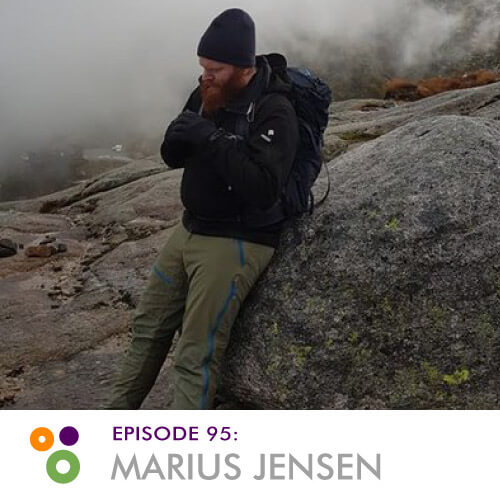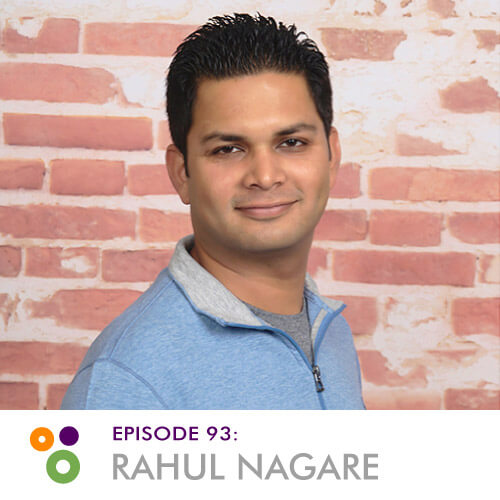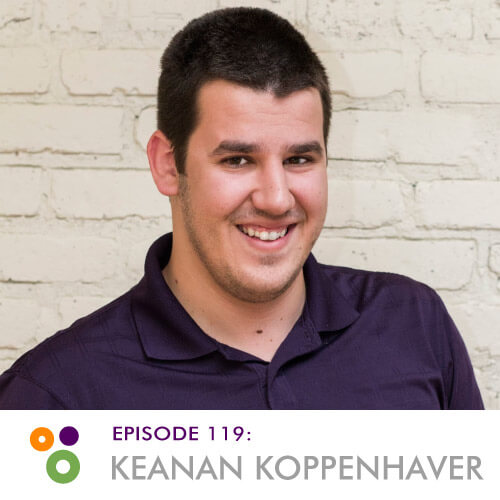Episode 69: Jan Dembowski

Podcast: Play in new window | Download
Subscribe: RSS
Introducing Jan Dembowski
Jan Dembowski has been volunteering with the WordPress Support Team for the past 12 years. He works for OpenDNS as a systems engineer where he helps the sales team. He is learning to master 3D printing and enjoys the occasional coffee.
Show Notes
Blog | Mostly Harmless
Twitter | jan_dembowski
Episode Transcript
Tara: This is Hallway Chats, where we meet people who use WordPress.
Liam: We ask questions, and our guests share their stories, ideas and perspectives. And now the conversation begins. This is Episode 69.
Tara: Welcome to Hallway Chats. I’m Tara Claeys.
Liam: And I’m Liam Dempsey. Today, we’re joined by Jan Dembowski. Jan has been volunteering with the WordPress Support Team for the past 12 years. He works for OpenDNS as a systems engineer where he helps the sales team. He is learning to master 3D printing and enjoys the occasional coffee. Hi, Jan, welcome.
Jan: Oh, boy. That’s like saying Einstein liked math. I definitely enjoy the occasional coffee.
Tara: Welcome. We’re really glad that you’re here, Jan. Can you tell us a little bit more about yourself including– I’m going to ask you to talk about coffee because you have one of the more interesting Twitter– I don’t know if it’s your Twitter handle or whatever, Twitter title is, your name that has to do with coffee. Maybe you can tell us a little bit more about that, too?
Jan: Sure. My Twitter handle is– do you remember when Twitter let you expand what you can put in as your name to something like 50 characters. And most people put something representative like, “certain goose steppers are bad.” You know, funny things like that. I put down in mine with Jan, I think I put in quotation marks, “Coffee is the best, coffee is the greatest.” As far as I can. I actually figured, okay, I put in my name and I kept spacing it out until it said, “Okay, you can’t type anymore.” I said, “Okay, I’ll take off a few characters from there.”
Tara: I’m looking at it, it’s Jan “SUCH COFFEE SO GOOD RESPECT COFFEE” Dembowski.
Jan: Exactly, coffee is your friend and it should be respected in our lifetime.
Tara: Well said. Okay, thank you.
Liam: Hear, hear.
Tara: Now you can tell us a little bit more about yourself other than your Twitter name.
Jan: So, I’m a volunteer for the WordPress Support Team and essentially, I have this routine where I wake up at just before 5:30 in the morning and not fully conscious, my routine entails walking down to, and please don’t hate me, the K-Cup machine. Loading up and getting an eight-ounce cup of whatever I have. At that point, I’m not even looking. It’s just on the pilot, I put it in and I get my coffee. Then I sit down at the computer, log into the forums and I start, while not fully awake, going through and doing day-to-day stuff. Clearing the spam queue. We have another queue called pending queue which sometimes you type in a lot of links and the forum goes, “We don’t think that’s spam but somebody should look at this first.” That’s my morning routine. I think that goes for 45 minutes. I try not to answer any topics at that time because complete sentences are not really the thing I can do at that particular hour. If you ever follow me on Twitter, in the background, I’ll have the news playing and I’ll just type something, someone said something horrific or irksome on the news. I’ll type it in and later on, I’ll be like, “Oh, my gosh. My mother was a sixth-grade grammar teacher. She must be ashamed of my grammar, and spelling, and punctuation. I bring dishonor to my family.”
Tara: That’s a pretty severe morning routine jumping into WordPress support right when you roll out of bed. How does one get involved to that level? You don’t work for Automatic, you’re volunteers, is that right?
Jan: Yeah, that’s correct.
Tara: What’s the process for vetting you? How does that work? You’ve been there a long time so they obviously trust you to do that, but what does it take for one to become a volunteer like that?
Jan: Really, it’s pretty simple. Different teams that WordPress has, Plugins, Community, we have a Marketing team. Wow, you guys probably know about that. Documentation. Support really is the easiest one to get involved because it’s frankly low-hanging fruit. You log into the forums and you start by looking at things that practically interest you. We have a section called ‘fixing WordPress’ where people will be like, “Hey, I woke up one morning and I installed a plugin and I can’t get into my WordPress. I get this error message. Here’s the error message.” That might be something that you’ve encountered or you recognized the error message and you could just type into the white text box just whatever steps that you feel could help them get through it. That could be something simple like, “I updated Akismet and now it’s showing me error message.” Okay, you type a message to them in reply saying, “You go into cPanel– you do have cPanel I hope. And you locate WP content, plugins, and Akismet, and just delete the Akismet directory. Don’t delete anything else. Delete that directory.” And shortly after that, if the problem is alive and they are looking for help, you may get a reply from them saying, “Hey, that’s fantastic. I can get to my WordPress installation.” Hopefully, they’ll present some more information. You can try to figure why that particular plugin caught fire. Maybe it was lacking dependency. Akismet is bad example because that generally works with everything, but for example, image plugins. I have this one plugin– I forgot what it was but the developer had dependency on cURL. I’m a huge believer of the WordPress HTTP API because it will just figure it out. If you have cURL, it will use it. If you don’t, it will just do what it has to do to get your webpage or whatever it is that you’re downloading in RSS feed. I took it off and my installation broke. I’ve got a lot of experience in sysadmin so I looked at what the error message was. I put the cURL module back but shortly after that, I got another plugin because I really don’t like cURL. Almost as much as I don’t like that other thing called sock puppets. That’s a whole different talk.
Liam: It may even be a whole different podcast.
Tara: Yeah, and we’re getting over my technical head already so I’m going to bring it back to this question. And it relates to what you’re describing, that anybody can sort of jump in and do that. I’ve gone to some happiness bars or whatever they’re called at my own meetup or WordCamps, and I often wondered how that process works because I did see once where somebody was volunteering to help and crash somebody’s site horribly and caused a problem. What I guess my question is going back to how does that work? What’s the process for vetting that so that people who are stepping into help actually know how to help?
Jan: It’s a little bit different in the forums because in the forums, you don’t really access folks. You’re making suggestions. And if you’ve really done this for a long time, you may couch that with, “Hey, make sure you have a backup. Make sure you know how to restore it in case something acts up or something.” When you have a happiness bar situation, there probably is going to be somebody nearby at the happiness bar who could get involved and go, “Oh, that wasn’t supposed to happen. Here, let me help you get out of that mess.” Because, you know, things do happen. Sometimes you’ll get a situation where somebody did something and it had unintended consequences. Nice thing about a happiness bar lounge type support table is that there’s almost certainly going to be somebody there who might be a little more along the lines of technical support and going to help you right there to get you out of the hole. There’s not really a lot of vetting, most of the time– I think we’re particularly lucky because the people who volunteer, I don’t want to say they’re known– they’re known to somebody. Like, when you’re at WordCamp US, we have volunteers for– Yoast sent a bunch of people, Taco, I think Taco helped out one time. People that have a reputation in the community, you know them on the forums, you know them on Slack. That kind of helps a lot. Occasionally, we do get someone who just out of the blue wants to help. But again, there’s other volunteers who if they get into the deep end of the pool, we can help them out.
Tara: Okay, thanks for explaining that.
Liam: That’s an incredible amount of work that the volunteers do. I was involved with the team for a period of time before I got more involved in community efforts. There’s a team of very hard-working people who give a lot of time, energy, and thought into keeping the forums moving forward, and to actually be a valuable place to get information. I think internet’s been around long enough, we’ve all been in enough forums to know that some of them were just knowledge skills to die. And the WordPress.org forums are hugely valuable so just a little shout out for all the work on that. Very rarely to the support you say, “Job well done.” Aside from very short online comments. Thank you very much for all you do there.
Jan: I really appreciate that. I know the rest of the support team will appreciate that too.
Tara: Yeah, it must be rewarding to help people – to solve people’s problems, they are usually very grateful and excited about that.
Jan: Especially when you go a little bit out of your comfort level. I’m kind of fortunate that I can spell CSS but sometimes– I was at WordCamp New York City at the Contributor Day and I had this very nice attendee help, and somebody posts this question. I’m pretty sure I knew that it was a margin. They wanted to do little padding on a graphic and their header, and I said, “Hey, how’s your CSS?” She said, “Pretty good.” I said, “Well, I think it’s this.” And she goes, “Well, yeah. Pul that up in the inspector and then type this.” And I’ve said, “Hey, thank you.” That confirmed that I’m not totally messing it up. I typed in the reply and she looked at it and she goes, “Well, you know what? Don’t have them do that by 10px, have them do it by five and type in something in there to increment that, to see if they like it.” A few minutes later, we got a reply from the topic poster that essentially said, “That was perfect, that’s exactly what I was looking for.” And I replied back to that one saying, “Fantastic. It was really the person next to me but you know.” When you got a recomfort zone, it’s really gratifying, especially when you help somebody who– you help them out and they learn something and you learn something, that’s very cool.
Liam: That’s awesome. Success, if you will, in support forum world. Speaking of success, I’m going to segue into one of our signature questions, Jan. I’m going to ask you to define success? What does success mean to you? What is your definition of success? That can be a personal definition, a professional definition, maybe a mixture of both? How do you define success?
Jan: To me, success is about growth. When we start out– I used to be in a– and now I’m in a completely different role, but I used to be in a role where I worked for companies and I deployed network kit, I deployed security solutions, and success was usually measured not burning down the house. We put something out on the weekend, we got on the call to monitor at seven o’clock on Monday and nobody joined the call. Hey, that was successful. Because happy people don’t join calls for things like that. But the reason I say it’s growth is because as I got older and more experienced, I was given more opportunities. I’ve been very lucky that I almost always worked for somebody that I liked or admired, that I had a good relationship with. A few years ago, my then manager said, “Hey, we’re looking for somebody to run the group that you work in. And I’m just like, “Oh, you want me to get you applicants?” And he goes, “No, smartie, I mean you.” I’m like, “Really?” And we talked about it, we talked about what was entailed. He let me think about it and over the weekend, I came back on Monday and I said, “You know, that actually sounds pretty cool to get a little bit behind the scenes.” He was like, “You’re still going to have to do the heavy lifting.” I’m like, “I know. I know who I’m talking to.” But it was really great, for three years I got to manage not a terribly big group. I think at one time, we had eight different people. Some parts of it I wasn’t particularly thrilled with. Because it turns out they really do– my boss was essential, “That’s great. Now you get to do the performance reviews.” [laughter] “Oh, you’re horrible.”, “Yeah, don’t be late. They do it on the 14th.” But yeah, growth. If you’re growing, if you’re challenging yourself, you’re going to have setbacks because we’re all human. But as long as you’re moving forward, that’s not a bad definition of success in my book. It can be scary, though, especially when you do new things. Our community really has a good understanding of imposter syndrome. Every now and then, that happens to all of us including myself where I’ll be just like, “Wow, I wonder if anyone’s going to catch on to that, I’m just making this up as I go along.”
Tara: Imposter syndrome, that probably keeps people from volunteering sometimes because they’re afraid that they don’t know how to help people. I guess, in terms of growth, you probably experience a lot of growth in your capacity as a support person. But we’ve talked a lot about supports. I don’t want to go back down there, I want to hear a little bit more about other ways that you challenge yourself to grow?
Jan: It’s kind of funny. The support thing of me in WordPress actually started out as therapeutic exercise. One of the nice things about challenging myself to provide support in the forums is I found that– because you’re very limited in what you do and type. It’s not like a Word document. You literally only have text, you get a little HTML so you can bold and italicize things, and not really much else. As a result of providing support in forums, I found that I became better at writing emails and technical documents and whatnot, because you get the– support forum posts basically forces you to be concise and, whenever possible, precise. And if you’re in engineering, have room for company, that’s very valuable capability to be able to just get to it. Like a lot of technical folks, you don’t really have to read all my email because first one or two sentences will tell you what you need to know. If you want to read the rest of it, fantastic, we’ll give you the backup. But the house didn’t catch fire and then you go on about what happened. And maybe the house did catch fire, there was a flood in the basement, start with that and then go up to the details. That’s much like replying to a support forum post. Somebody has a problem, walk them through what they have to do as concise as you can. And don’t be afraid to make mistakes because everyone does. I don’t try to not make mistakes. This is going to sound weird, I try to make new mistakes.
Tara: So not repeating the same lines?
Jan: Yeah. I get a little disappointed when I repeat them. Of course I do, but I try, I really try not to.
Tara: And like you said, communication is a very important way to grow. And sometimes we do make the same mistakes in communicating poorly. That’s something to always work on.
Liam: Jan, you’ve talked about working for OpenDNS?
Jan: Basically, a few years ago, six years ago? A little before my time at the company, they had this really great idea. What if you, when you wanted to inadvertently click on sale, link to a phishing site. Instead of giving you the IP address of a phishing site, we gave you the IP address of the block page that said, “That’s a bad place to go.” You kind of see that with search engine hits. You ever go to a link and you get red screen of, “This is not a good idea. Do you want to proceed or not?” As a company, they decided to do that with DNS for a couple of reasons. It’s really fast. Instead of going someplace, downloading a bunch of stuff, having to get interrogated by your PC, your laptop gets real hot and stuff like that. “Hey, we have real good reason to believe that’s a bad site and we’ll block it for you. It’s very fast and it’s very efficient.”
Liam: So is that a subscription service, say a company might say, “Pay your monthly fee to–” Any link that people click on from within their systems or networks.
Jan: This is one of the things that appeals to me. If you’re a regular person at home, I always recommend that people put this on their grandparents’ computers because– and I’m not being judgmental. Anyone, please, listening to this, don’t hate me. I’m not making fun of senior citizens or anything like that. But people don’t know. They click on the link they got the email and bad things have happened. OpenDNS is free for users at home. You sign up for it, you run a little agent that just tells OpenDNS, “This is Liam.” It’s an IP updater because files or whatever you have will change an IP address from time to time, and you’ll get protected. It’s really that simple. I think we’ve got 90 million users and the majority of them actually are users at home being protected as a public service. Now if you’re a company, then, yes, we actually have enterprise version, it’s very effective. It works. Part of my job is to support the company that sells that particular service.
Liam: That’s really interesting, that a company like– and I know very little about Cisco as a company and I’m not denigrating them.
Jan: They’re a nice company actually.
Liam: It strikes me as an interesting business model and I wonder if it’s reflective of the changing internet-based account where I’m on the riverside now as I’m chatting with you. The basic home user variations that they offer are free. Is that new to something like Cisco, that kind of approach? That’s really interesting.
Jan: So the answer is yes and no, and I’ll explain what I mean by that. OpenDNS was an idea that came up outside of Cisco and it worked really well with Cisco’s model where they want to go as a company. That’s cool, they’re actually very responsible. I really liked working for them. Have you ever heard of Snort? They have a little pig and they sniff packets on the network and stuff like that. There was Sourcefire, and like OpenDNS, Cisco purchased Sourcefire, an open source company. Here’s where it gets really interesting in my mind. They do security intelligence, they look up threats, they identify threats, they write about threats, they write about how to mitigate threats. The best part is they don’t just do that for their customers, they do that for the entire internet. There’s a group out there called Talos Intelligence. The folks working there in security are primarily old veterans, they’re fantastic. I had an opportunity to meet one of the people in Minneapolis who manages a group of them at that location and they’re really cool. They identify threats and they protect users all around the world and, again, that’s not just something they do for Cisco costumers, they do it for everybody. After the company that I ended up working for, they would be number two on my list to work for, but to be perfectly honest, I just don’t think I have security or programming chops to pull that off. They’re, I don’t want to say hardcore, but they really are.
Liam: Yeah, it sounds like it. Let me ask you this. Let me swing around to one of our other questions here and ask you about advice. The question is this, what is the single most valuable piece of advice that you ever have received and implemented in your life? What’s some advice that somebody has shared with you that’s really made a significant difference to your life?
Jan: Oh, boy. I can see why you say you’re not going to make me cry. I’ve been a little lucky growing up that– fortuned that I have a lot of, I guess, role models. You don’t think of your family members as role models. It’s only later on after they’re gone or something where you’re just like, “Oh, my gosh.”
Liam: Yeah, you spend most of your young life getting mad at them for not letting you do exactly what you want. And then later you’re graceful that they didn’t let you do exactly what you want.
Jan: Exactly. I think the best advice I ever had was my grandmother on my mother’s side, she basically was very clear that, you know, never be ashamed of who you are. If you make a mistake, own it and apologize for it, take responsibility for it. And stand up for yourself. Very simple advice but when you’re a gawking nerd growing up and whatnot, you can count your friends who are also nerds, that kind of helped too. That’s actually pretty good advice. I’ve got high schoolers and I think they’re pretty confident. Maybe I should check on them every now and then. But for me growing up, there was this idea that if you’re a teenager or pre-teenager, you are by default doing something wrong, which, looking back, wasn’t necessarily incorrect. But it was particularly good advice from both my grandmothers to stand out for yourself, and take that seriously. Have a good time, be yourself, and don’t take anything from people that you didn’t particularly earn.
Tara: Yeah, I think there are sort of two sides to what you’re saying because you talked about, when you make a mistake, own it, and also stand up for yourself. That means really being honest about when you need to own it and when you need to not own it. Do you think that that advice meant something to you when you were younger when you first heard it? I think about high schoolers more as thinking that they know more than you. [laughs] I don’t know, is that advice that has settled in with you and meant more as you’ve gotten older or did it strike a chord with you when you first heard it?
Jan: At the time, it didn’t quite strike a chord with me when I first started because like a lot of kids that age, I just by default thought I was smarter than everybody else. I didn’t really realize that that was something you have to earn. You just didn’t get recognition for showing up. There’s a social commentary there about certain– our society today, I’m sure, but that could get kind of long.
Liam: Yeah, moving along. [laughs]
Jan: Moving along, moving along. Yeah, as I got older, I look back at both my grandmothers and I’m kind of– looking back, I’m in awe how smart they were. You never think it growing up but they really had it together and I was to benefit for sure of that.
Tara: That’s wonderful. I think when we get to this point in our lives as we look at those types of things, we wish that we could make our kids aware of it now so they don’t realize it too late as well, but that just does not work.
Jan: It doesn’t.
Tara: But that’s why I really appreciate you showing that with us and telling us a little bit about your grandmothers. They sound like they were strong and strong enough that they left a good impression behind.
Jan: One of my grandmothers was, I think, all of, in heels, five feet tall and she taught me how to punch and she gave me a bloody lip by accident. [laughter] She felt really bad about it, it’s like, “That’s going to go well. [laughter]
Tara: That’s wonderful! Oh, cool.
Liam: That is really neat. Jan, let me use up just the last few minutes that we have because we’ve talked about growth and we’ve talked about this great advice that your grandmother shared about, “Be who you are and own your mistakes, and don’t take things off of people that you shouldn’t. Respect yourself.” With all this around us, can you share with us what’s been your biggest challenge to date? What’s been your biggest challenge? And maybe touch on a little bit, if it’s ongoing, how are you dealing with it or how did you deal with it, how did you overcome it?
Jan: I think the biggest challenge is getting out of habits, if that makes sense, getting out of ruts. I worked in a particular industry for about 19 years and about a year and a half ago, maybe not quite that long, I completely changed jobs into a brand new career. That was a bit of a hurdle for me to get it over. First I had to work out the nerve to even apply for it. The more I did the interviews, the more I talked as I got closer and closer to them making me an offer, I realized that I really wanted to start something brand new. The biggest hurdle was listening to everybody else saying, “Hey, you can actually do this. There’s no reason to think you can’t do this.” And actually, walking across the threshold, accepting an offer, and working with a company that I work for now. It’s been, I don’t know, let’s say 14 months, and I had fun time doing challenging things. I’m able to flex skills that I never really had to focus on. I mean, I’m getting into writing Python scripts to blow things up and process them and stuff like that. Thing is that I used to just take for granted and never really had to do. And now that coworkers who are like, “Hey, we need to parse gigabytes and gigabytes of logs and get stuff out of it. Can you take a look at it?”, “Sure, just upload that up onto our favorite cloud-based file storage and I’ll download it.” And I do and I get paid tell people do that to get their goals, and that’s pretty cool. A couple of years ago, I would never have thought or entertained the idea that that was something I could do, let alone do it in a way that people depend on me to actually do this thing. Yeah, the biggest hurdle is just continually reminding myself that– back to imposter syndrome. This actually is something I can do. In the last gig that I had, I was a rock star. I was a guy you called to shut down 17-hour outage call, and I did. Now, I’m doing something completely different and I’m not a rock star. I am fortunate to work with people who do the job amazingly well. I’m in awe of how well they do it. It’s great just to be able to start over and get out of that comfort zone and do brand new things. I really have great time with it. That’s been a hurdle.
Liam: Yeah, success is growth.
Jan: I actually quite believe that. It also helps that I have grown ups around me in my life who tell me things like, “You know, this is going to be okay. Even if it doesn’t work out, it’s still going to be okay.”
Liam: That is awesome. Thank you so much for sharing that. I’m afraid, we’re going to have to wrap it up. We are on time here. Jan, before we say goodbye to you, can you share where people can find you online and interact with you?
Jan: One of these is my Twitter handle. It’s spelled Jan. Don’t say January. Somewhere Mika is going to hear this and she’s going to say “January.” @jan_dembowski. I’m sure there will be a link. I also spend a great deal of time in the Forums WordPress Slack chat. We use that primarily for administrivia. Like, “Hey, there’s a spam.” Or somebody forgot to close an ordered list and it broke the formatting, stuff like that. But we do have weekly meetings and I try to attend. I don’t always get to participate but yeah, you can find me on Twitter, you can find me in forums channels, you can find me on the forums, but you better have a support topic if you go there.
Tara: Great. Thank you again for joining us.
Jan: Thank you for having me.
Tara: really great to meet you and hope to see you in person sometime. Take care. Bye.
Jan: Thank you. Bye.
Liam: Thanks, Jan.
Tara: If you like what we’re doing here – meeting new people in our WordPress community – we invite you to tell others about it. We’re on iTunes and at hallwaychats-staging.ulpgsyz6-liquidwebsites.com.
Liam: Better yet, ask your WordPress friends and colleagues to join us on the show. Encourage them to complete the “Be on the show” form on our site, to tell us about themselves.
Tara: If you like what we’re doing here – meeting new people in our WordPress community – we invite you to tell others about it. We’re on iTunes and at hallwaychats-staging.ulpgsyz6-liquidwebsites.com.
Liam: Better yet, ask your WordPress friends and colleagues to join us on the show. Encourage them to complete the “Be on the show” form on our site, to tell us about themselves.





